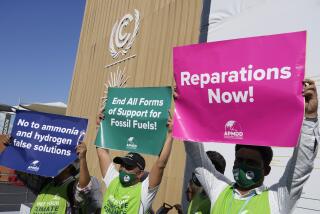In Policy Shift, U.S. Seeks Talks on Global Warming
- Share via
VALLETTA, Malta — In a major shift of Administration policy, President Bush proposed Saturday at his summit meeting with Mikhail S. Gorbachev that the United States host an international conference next fall to begin writing a treaty to control global warming.
If the Soviets accept the proposal during summit sessions today, it would dramatically advance international efforts to cope with the threat of global warming. The two superpowers are the world’s two largest contributors to the global warming problem. And, together with Japan, they are the major developed nations that, until now, have been reluctant to begin negotiations on a global warming treaty.
Even in advance of agreement by the Soviets, Bush’s decision is a significant step, marking a rapid shift in U.S. policy that, according to Administration officials, has developed over the last month.
“The United States’ position seems to become more progressive weekly, even daily” on the global warming issue, said one official who has been closely involved in Cabinet-level debates on the issue. Bush’s final decision to agree to host a conference was made only Thursday and communicated to senior officials as the President headed for Air Force One to fly to Malta, the official said.
Global warming is widely believed to be a result of the burning of coal, oil and other fossil fuels and the destruction of tropical rain forests. Many scientists believe the warming process could significantly disrupt world agriculture and raise sea levels across the globe. But, because the causes of the warming are so widespread, reversing it could require major and potentially disruptive changes in the global economy.
In addition to the United States, the Soviet Union and Japan, many Third World nations also have resisted the idea, seeing it as a potential block to their development efforts.
Within the Administration, several senior presidential advisers, including science adviser D. Alan Bromley and White House Chief of Staff John H. Sununu, had argued earlier this fall that scientific evidence on global warming--particularly on its actual impacts on human life--was too thin to begin writing an international treaty that could cost U.S. industry billions of dollars.
Hosting an international meeting to begin writing a treaty would expose the U.S. government to too much pressure to agree on unrealistic steps, these officials feared.
Other Administration officials, including Environmental Protection Agency chief William K. Reilly, argued that the United States was in danger of being perceived as a laggard in responding to a major environmental threat.
Reached after word of Bush’s decision, Bromley said the change had come about because “we know a lot more now than we knew even a few months ago.” Calling for an international treaty-writing session “was premature” last month, but is no longer, Bromley said.
In addition to the treaty-writing session, Bush also proposed a session next spring in Washington that would bring together international experts on the potential impacts of current warming trends. Bush urged the Soviets to attend that session.
For the past two years, global warming has been handled by three international panels studying the issue. The United States chairs the panel considering responses to the problem, Britain chairs a panel looking at the scientific questions surrounding the phenomenon and the Soviets chair the panel considering potential impacts that global warming might have on the environment. Before Bush’s decision, U.S. policy was to refuse to even talk about an international conference until after those panels had completed their work.
Late in October, opposition from Sununu and Bromley forced Reilly to abandon plans to call for a global treaty-writing session as part of his presentation to an international conference on global warming held in the Netherlands.
But, an Administration official said, over the last month, intensive study of the scientific evidence surrounding global warming as well as the international political context had convinced Bromley and others within the Administration that the global warming issue needed to be put on a faster track.
The United States “was viewed as foot-dragging” the official said.
Bush’s offer, said another senior official, “represents a signal that the United States feels it shouldn’t be on the defensive on this issue.”
“Rather than being perceived as trying to run from the issue, we should seek to be perceived as leading,” he added, noting that the Administration already had taken several steps, including new automobile fuel economy standards and proposed revisions to the Clean Air Act, that would help in combatting global warming.
More to Read
Get the L.A. Times Politics newsletter
Deeply reported insights into legislation, politics and policy from Sacramento, Washington and beyond. In your inbox twice per week.
You may occasionally receive promotional content from the Los Angeles Times.











